
Guests
- Adnan MirzaKuwaiti-born Pakistani Houston Community College student, sentenced to fifteen years without parole for conspiring to provide material support to the Taliban and for unlawfully possessing firearms. He is appealing the decision.
Adnan Mirza, a Pakistani citizen who came to the United States on a student visa, has been sentenced to fifteen years in prison without parole after being convicted of conspiring to provide material support to the Taliban and for unlawfully possessing firearms. While federal officials hailed the verdict, Adnan’s friends and supporters say he is innocent and that he was set up and framed by an undercover FBI informant. We spoke to Adnan last week, one day before his sentencing. [includes rush transcript]
Transcript
AMY GOODMAN: We turn now to the story of a foreign student who came to Texas on a student visa, was sentenced to fifteen years in prison without parole Friday. His name is Adnan Mirza. He was convicted in May for conspiring to provide material support to the Taliban and for unlawfully possessing firearms. While federal officials hailed the verdict, Adnan’s friends and supporters say he’s innocent and that he was set up and framed by an undercover FBI informant.
Adnan is a Pakistani citizen who was born and grew up in Kuwait. He came to the United States on a student visa to attend Houston Community College. He spent time volunteering at a program to feed Houston’s homeless and worked with local Muslim community groups. In 2005 and ’06, Adnan went on a number of camping trips with friends in North Houston. It turned out the FBI had recruited one of those friends, Jim Coates, as an undercover informant. Another man in the group, Malik Mohammad, also turned out to be an undercover FBI agent. They recorded conversations with Adnan and others and took pictures of them holding guns.
The government said the undercover investigation revealed Adnan and others had engaged in weekend training and practice sessions with firearms to prepare for a jihad. They also said Adnan had intended to send money to the Taliban. Adnan denied the charges. Instead of accepting a plea bargain, which would have meant he would be out of jail now, he went on trial, and he was convicted and sentenced to fifteen years without parole Friday.
I spoke to Adnan from prison the day before his sentencing. I began by asking him what he was doing in Houston before his arrest.
ADNAN MIRZA: I was a volunteer with a couple of Islamic organizations in Houston that were involved in mostly charity work, including like relief and also media, which included like having a TV show on the local public access channel and trying to address Muslim issues that were not being addressed, like, in the mainstream and trying to answer questions that the indigenous people in the United States had about Islam and Muslims. And the relief activities included feeding the homeless on a regular basis, taking care of the refugee population in Houston. We have an extensive refugee population in Houston from Africa, from all war-torn countries, basically. I used to get try to, you know, like, get them food and food supplies and books and toys for children and stuff like that.
AMY GOODMAN: What was your reaction to the verdict, finding you guilty? Now you face forty years in prison.
ADNAN MIRZA: Well, I wasn’t surprised, I mean, based on how things went in the courtroom, as, like, my counsel, he did not put up a good defense. I mean, we were not — I mean, I did not spend a whole bunch of time with my counsel, and I didn’t expect him to know anything about this, when he didn’t speak to me about it. So it wasn’t unexpected. But I still have the appeals process, and hopefully that will come through for me.
AMY GOODMAN: Adnan, take us through your arrest. What happened?
ADNAN MIRZA: Well, right now I do have the benefit of hindsight. So, what initiated the investigation was a regular traffic stop in Big Bend State Park, where the confidential informant and my co-defendant, Mr. Williams, were stopped by the park ranger for speeding. And the park ranger basically flagged the Border Patrol to check the vehicle out when they left the park. And when they went through the Border Patrol checkpoint, they contacted the FBI, and the FBI basically detained them for a few hours and questioned them and let them go back to Houston. Once they were in Houston, both the co-defendant and the confidential informant, they were again approached by a different unit of the FBI. But their response was different. The confidential informant was, you know, very open to their questioning, but my co-defendant was, like, reluctant, so he decided to talk to them only in the presence of an attorney.
AMY GOODMAN: And who was that co-defendant?
ADNAN MIRZA: Mr. Williams. And his attorney, apparently now he’s working with the government as the antiterrorist trial lawyer in DC, Mr. Hamdani. And he was supposed — I mean, back then, he was working on behalf of the ACLU, and he represented Mr. Williams with the [inaudible]. And after our case, he was offered a job with the government, and now that’s what he’s doing.
AMY GOODMAN: Who is Kobie Williams? How did you come to know him?
ADNAN MIRZA: Well, after 9/11 — I mean, I had —- I came to the United States in August of ’01, and 9/11 just happened within like eighteen days. And after what I saw on the TV, it was -— I mean, it was like — I thought that it was important for me to get involved in the media and somehow, you know, tell their ground realities in the Middle East. You know, I just felt it was an obligation on my part to educate people, because I was in Kuwait when it got invaded by Saddam Hussein. I mean, 9/11 was almost similar in that sense. And I could see that there would be a war, and I just wanted to, you know, do something so that I could try to stop it, like by educating the people, since it’s a democracy here. I mean, you know, people really are supposed to be — government of the people, by the people, for the people.
AMY GOODMAN: And so, what happened afterwards? How did you meet up with Kobie Williams?
ADNAN MIRZA: Well, I was introduced to this group that was along the same lines working for the media. And it was a neighbor who introduced me to the group. And that’s where I came across confidential informant, and who was not a confidential informant back then, and Kobie Williams and other people. And we started, you know, trying to find ways where we could express our views through the media, nonviolent means, basically. And it started off in, I believe, November of ’01. I have known Mr. Williams ever since that day.
AMY GOODMAN: And so, how were you picked up? How were you arrested?
ADNAN MIRZA: Well, with my experience with Mr. Williams, I just knew that he was a very — you know, a person who had — he was a Muslim, but he just came into Islam, like, through a sudden change. And he was very inquisitive about questions. And I just knew him to not be able to understand things in the way that, like, everybody else does. So he was always curious about things. So when he was — after his encounter with the FBI, his views changed about the United States. He wanted to leave the country, just to get out of here. And I tried to stop him. I said, well, you know, I have come from the Middle East, and it’s not like what you think it is over there.
AMY GOODMAN: You’re talking now about Kobie Williams?
ADNAN MIRZA: Right, right. But the confidential informant by then was trying to instigate Mr. Williams into saying that, you know, well, you should try to get out of here and go to Iraq and Afghanistan. And my whole thing was to try to stop Mr. Williams. But it seemed to me that, you know, that Mr. Williams could not do anything by himself. It was just like he was very impulsive and reactionary, and that if I was able to stall him for a while, he would change his mind. And that’s how I got into the thing. Like, everybody around us tried to pounce on Mr. Kobie and telling him, you know, this is not how things are. But he was just like, you know, very rigid about his views, that he wanted to leave the United States.
AMY GOODMAN: And the confidential informant was Jim Coates?
ADNAN MIRZA: Right. Right.
AMY GOODMAN: And who was Jim Coates? How did you understand him as a part of your group?
ADNAN MIRZA: Well, when I joined the group, Mr. Jim Coates and Mr. Williams were already working with that group. And Mr. Jim Coates back then was very articulate, and he was basically spokesman for the Muslim community. I mean, that’s how I understood. And he was — him and I were involved in training the law enforcement in Houston, like HPD, and even Department of Justice, on sensitivity training programs. So, I knew him and his ex-wife through those programs.
AMY GOODMAN: You worked with the Houston Police Department, sensitivity training?
ADNAN MIRZA: Yes, yes. I was — me, myself, Mr. Jim Coates, his wife and — yeah, we conducted a class together. I usually did the technical aspects, but sometimes I was also involved in the classes. I was always present.
AMY GOODMAN: So talk — we don’t have much time. Talk about what you were charged with, what you were convicted of.
ADNAN MIRZA: I was charged with conspiracy to provide material support to terrorists, which in this case is the Taliban. And the amount that is alleged that I had sent is like about $350. And the other charges were like firearms-related and then just conspiracy to possess firearms illegally.
AMY GOODMAN: Who did you send the money to?
ADNAN MIRZA: We sent the money to a hospital, which cared for the widows and orphans in a part of Pakistan.
AMY GOODMAN: So, are you denying you sent it to Taliban fighters?
ADNAN MIRZA: Yeah, definitely. I do not agree with that, with the Taliban or al-Qaeda, because I know they have been created by the Pakistani government during the '80s to fight the Russians and stuff. So, I mean, to me, to support somebody like that is just — I mean, I don't believe in that concept at all.
AMY GOODMAN: And the issue of firearms, the issue of the illegality of a student like you on a visa here, a student visa, not being allowed to have a firearm, what was your response to that?
ADNAN MIRZA: Well, I had a hunting permit, and I took a hunting education class. Under the statute, I can possess a firearm. And basically, when I had — before I came to the United States, I had never possessed a firearm. In fact, it was only after the Big Bend encounter that the confidential informant invited me to his home and said, “You know, I want to do some hunting really bad. And would you like to do it with me?” I said, “Well, I have to first check whether or not I can do it.” And then I went through the process of the getting the hunting education class. It was like a three-month process. That’s when I first possessed my — I mean, a firearm. I mean, it was under the Texas government program. And after it was confirmed that I could, that’s when I really went ahead and started target practicing, just so that, you know, I could go hunting with him.
AMY GOODMAN: And yet, you were convicted of possessing a firearm illegally?
ADNAN MIRZA: Yes, yes.
AMY GOODMAN: On what grounds?
ADNAN MIRZA: Well, they are saying that, you know, I was illegal, and my status was violated. First they said it was violated because my student visa had expired. But then it was determined that, you know, when you come on a student visa, you come here on a durational status, which is maintained as long as you are in school. So I was never outside of school. I have always been an honors list or dean’s list student. And, I mean, I was always — I mean, that was my valid status. But then they said, “Well, you were receiving money.” I said, “Well, by sponsor.” And it’s like my sponsor was giving me money, but he was giving it through a check.
AMY GOODMAN: Adnan Mirza, I’m just afraid it’s going to cut off. I wanted to ask, you could have pled out here and faced how many years in jail? Yet you went to trial, and I want to ask why.
ADNAN MIRZA: Well, I still believe that my story should come out, because the main crux of the matter is that Mr. Williams, as per my understanding, has an intellectual disability. I mean, I think he should be diagnosed with either Asperger’s syndrome or high-functioning autism. But nobody wanted to point that out. I mean, and the government informant and the agents who were working with the government knew that Mr. Williams was intellectually disabled, but they still targeted me. And I, being a person who —- you know, I’ve always been raised as, like, to take care of people who are in need and disabled, and I just tried to protect [inaudible] -—
AMY GOODMAN: If you had accepted a plea bargain, how many years would you have served in jail?
ADNAN MIRZA: A maximum of five years. I would have been out by now.
OPERATOR: You have one more minute for your call.
AMY GOODMAN: In this last minute, what would you like to say? Why did you go to trial facing forty years, if you could have been out by now?
ADNAN MIRZA: Just I want the truth to come out. I want the people to know that I — first of all, that true practicing Muslims do not believe in supporting any violent cause.
AMY GOODMAN: Adnan Mirza, was speaking to us from jail the day before his sentencing. He was sentenced to fifteen years in prison without parole for conspiring to provide material support to the Taliban and for unlawfully possessing firearms. He is appealing the decision.

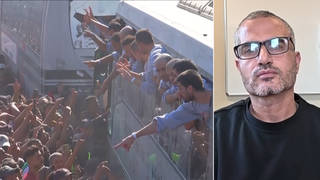
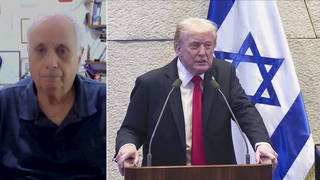
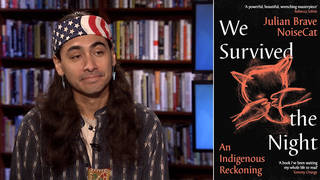





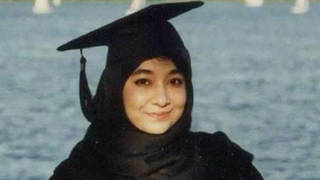
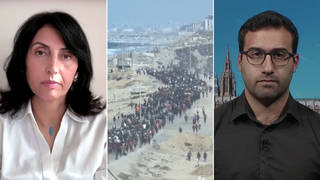
Media Options